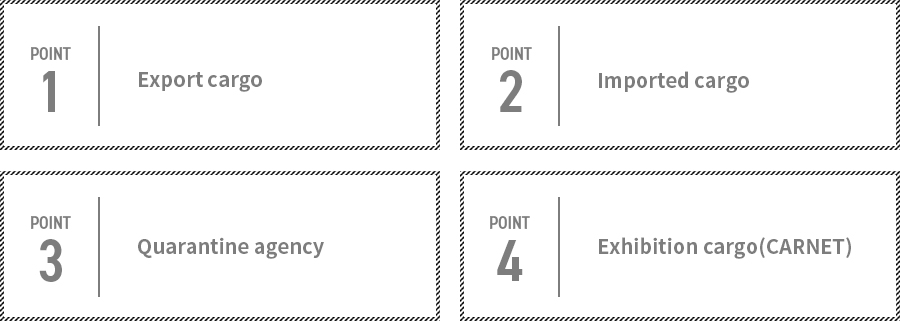CUSTOMS CLEARANCE
CUSTOMS CLEARANCE

Import customs clearance declaration
When cargo arrives from overseas by ship or plane, before the customs clearance it is handled as foreign cargo and gets temporarily stored in a bonded area at a port or an airport. In order to handle this foreign cargo as domestic circulation cargo, an import declaration is required to be submitted to the customs authorities which have jurisdiction over the bonded area where the cargo is kept.
During the import declaration procedure the names of items, their quantity, prices, etc. are confirmed using the cargo documents (C/INVOICE, P/L, B/L, etc.), the contents are checked, classified and once the declaration form is created, the import declaration procedure is completed (tax filing method). If necessary, cargo inspections by the customs will be conducted.
(Tax number, confirmation of cargo, confimation of conflicts with other laws and regulations, confirmation regarding goods prohibited for import, etc.).
In addition, in case customs duties are required by the Customs Act and the Customs Tariffs Act etc., the import will be permitted by paying them together with the consumption tax which is necessarily required by the Consumption Tax Law.
Export customs clearance declaration
If you want to send cargo overseas, you need to file an export declaration to submit to the customs authorities in the area of your jurisdiction.
During the export declaration procedure, export documents such as C/INVOICE, P/L and additional certificates to comply with other laws and regulations, etc. are required.
During the export clearance procedure, after confirming that the cargo is exported according to laws, regulations, etc., and whether there are conflicts with different treaties, etc., the declaration form will be prepared based on the schedule of ships, planes, etc. and the declaration procedure will be carried out.

- COMPANY
-
BUSINESS
-
WORLDWIDE NETWORK
- MJ LOGISTICS (HK) LIMITED
-
MJ LOGISTICS (HK) LIMITED
TAIWAN BRANCH - SHENZHEN MJ LOGISTICS CO.,LTD
-
SHENZHEN MJ LOGISTICS (FOSHAN)
BRANCH - MJ LOGISTICS (VIETNAM) CO., LTD.
- MJ LOGISTICS (HANOI) CO., LTD.
- MJ LOGISTICS (JAPAN) LIMITED
- MJ LOGISTICS (SHANGHAI) LIMITED
-
MJ LOGISTICS (SHANGHAI) LIMITED
GUANGZHOU BRANCH - MJ LOGISITCS (TIANJIN) LIMITED
- MJ LOGISITCS (QINGDAO) LIMITED
-
MJ LOGISTICS (SHANGHAI) LIMITED
XIAMEN BRANCH -
MJ LOGISTICS (SHANGHAI) LIMITED
CHONGQING BRANCH - MJ LOGISTICS (THAILAND) CO,. LTD.
- MJ LOGISTICS (MANILA) CO,. LTD.
- PT. MJL LOGISTICS JAKARTA
- MJ LOGISTICS (SG) PTE. LTD
- MJ LOGISTICS (NINGBO) LIMITED
- MJ LOGISTICS (TIANJIN) LIMITED DALIAN BRANCH

